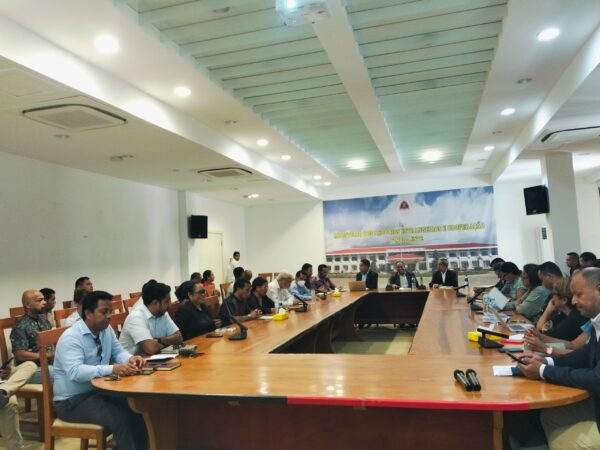Dili, April 15, 2025 (Média Democracia) – The Anti-Corruption Commission (CAC) conducted a socialization session regarding Law 7/2020 on the obligations of public officials and diplomats at the Ministry of Foreign Affairs and Cooperation (MNEK), focusing on asset declaration registration in the Koima system. The activity took place in the MNEK meeting hall.
In an interview, MNEK’s Secretary-General João Freitas de Câmara expressed appreciation to the CAC commissioner for conducting this socialization on the law aimed at preventing corruption, particularly for MNEK, where many officials have not yet registered. He emphasized that such socialization is very important to ensure that every individual takes responsibility for their duties and contributes to corruption prevention, especially since MNEK has a large number of senior officials, from technical secretariats to directors, staff, and department heads.
“I believe this law’s socialization is highly beneficial, especially for diplomats who must submit a declaration letter to avoid corruption risks. The declaration form is essential for all diplomats and public officials. Besides that, the socialization provided by the commissioner helps our public officials and diplomats better understand what they must avoid, particularly those in leadership roles,” said João Freitas de Câmara.
He also mentioned that MNEK currently has around 130 active diplomats abroad, while at headquarters, there are about 20 senior officials including Director-Generals, National Directors, and Department Heads.
On the other hand, CAC Commissioner Rui Pereira stated that the CAC’s visit for this socialization is part of their routine tasks to share information with ministries and state institutions, especially about complying with Law No. 7/2020 on asset declarations and responsibility in service execution.
“Today we heard directly from the MNEK Secretary-General that the data they have shown that about 40 people have been fined for failing to declare their assets in a year. That’s why CAC came here to provide clear information on how to access the system, register, and declare assets so in the future, no one else will be subject to these penalties,” explained Rui Pereira.
He further noted that this activity has a positive goal because, as the Secretary-General mentioned, a list of names was provided showing who had been fined, including some former ambassadors whose mandates had ended but who still had not submitted their declarations. Some active officials also had yet to register, so CAC’s presence was to give MNEK the opportunity to push for full compliance, especially among advisors and other staff who must register through CAC’s existing system.
“The registration mechanism is handled by technical staff who assist and explain the process to participants so they can complete their registration. Because MNEK deals with diplomats, the system also monitors ambassadors for example, there are four ambassadors currently abroad. CAC asks for their names so notifications can be sent, allowing them to register through the system. As for leadership positions like department heads and directors, usually CAC receives appointment letters from the Minister or the Public Function Commission, and in these cases, CAC often conducts socialization directly within state institutions,” added Rui Pereira.
He shared that, across all institutions, as of this year, around 8,000 individuals have registered in the CAC system, out of which about 5,000 have fully complied, while 2,000 more still have not completed their registration. For those who haven’t, the CAC sends notifications and, if they fail to comply, financial penalties can be imposed. Because of this, CAC continues socialization efforts, especially with municipal authorities, as CAC already has detailed data.
“Two weeks ago, before heading to activities in Washington, we found that in Baucau Municipality, around 200 public servants hadn’t completed their registration. Among them, around 110 were heads of departments who hadn’t yet registered in the system, while 70 more had registered but hadn’t finalized the process. Because of this, they are at risk of financial penalties and some have already submitted complaints. Some cited issues like poor internet connection, but this is not a valid excuse. If any staff members are pregnant or ill, and they submit a medical letter from a hospital, CAC may consider this when reviewing penalties and forward the situation to the Ministry of Finance for consideration,” Rui Pereira explained.
He reaffirmed that CAC continues its efforts to prevent corruption and is also actively conducting investigations in some institutions. He urged public officials, including ambassadors, to register in the system to avoid financial penalties. “You should register to avoid fines because this is about protecting your hard-earned money,” he said. He also underlined that everyone must perform their duties with responsibility and maintain strong cooperation for the future.
Report : Domingas
Photo : Domingas

